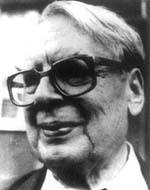Understanding History
PlausibilityThe situation envisioned by a historical explanation, its scenario, or the way in which it is seen as coming about, should be plausible. The consequences of a historical theory should also be plausible. What does "plausible" mean? If at bottom it means no more than "familiar," it is a circular criterion and thus not very useful in judging our understanding of past situations.
"Plausible" means that things could have happened that way. It means that a given theory does not involve extremely unlikely events, and does not reverse normal expections of development. A seed grows into a plant, and not a plover. An acorn grows into an oak, and not an oriole.
The criterion of plausibility implies an experience of how things happen in history, and in human affairs generally. It is this sense of what is reasonable that Ranke calls for:
"To accomplish anything in history there are three requirements: a sound understanding of people, courage, and honesty. The first, simply for insight into things . . ." (Diaries, c1843)
An insight into how things work in the real world. Plausibility requires a rejection of miraculous events, and of extreme but convenient coincidences. It expects that results will follow causes, and that complex developments will arise from simpler stages. It puts the cart before the chariot. It looks for oaks growing from acorns. It frowns on positing social mechanisms that are not otherwise attested in that society. It discourages the assumption that people in remote ages will behave with a magnanimity and harmony for which no other age provides a precedent.
These expectations can be unpacked somewhat.
Plausibility does not accept a divinely ordered history. It recognizes that a belief in magic is a fact about some people in history, but it does not itself believe in magic. With due allowance for cultural variation, it does not expect that people in one time or place will act out of radically different motives than people at other times and places. Physics expects the order of nature (the valence of carbon, the speed of light, the square root of minus one) to be uniform throughout nature. History has a roughly analogous expectation about individuals and societies. By "rough" I mean rough, but by "analogous" I also mean analogous.
Dangers
The criterion of plausibility should not be used to legitimate parochialism. The Western European experience, and the recent American offshoot of that experience, however successful in their way, are probably very atypical in world history. Many people and societies, both now and in the past, have different experiences, and operate on different social assumptions. Here is a revealing comment from a professor at the University of Papua New Guinea:
"A public prosecutor says in an interview that there is "anarchy" in the land. This remark is made by him whilst expressing his disappointment that he cannot prosecute someone in the imported court system who has murdered another. This is because the matter has now been settled in the traditional Melanesian way in the village by the two opposing clans. . . ."
"That the matter has been settled in the way Melanesians understand and thus has brought reconciliation over this issue and thereby peace for the two communities is totally ignored by someone who has been trained in a foreign legal system. . . The powerful way of settling disputes by the traditional elders and chiefs is . . treated as . . insignificant."
". . . take the scenario where a man who has murdered his wife ends up in prison. The relatives of the deceased then allow themselves to be imprisoned so that they can make retribution for the loss of this life by killing the prisoner. . . Justice according to how the Melanesians see justice is not the same as that which has been imported and is currently considered to be official."
The Melanesian system, like every other known early legal system, relies not on the mechanisms of the police state but on the devices available to a laterally organized society, the chief of which is the device of retribution. We who are accustomed to police state thinking need to pry ourselves loose from our legal instincts. As implied on the Inscenation page, we need to make an effort of disacclimatization before we can hope to understand the Hittites or the Romans or the Melanesians. Or out own country a hundred years ago. We need to recalibrate. But once we have done so, for a given past situation, the difference between plausible and implausible reasserts itself, and this time with greater force and relevance.
Academics, who move in a protected environment, are especially prone to extrapolate from their own comfortable but atypical experience. They need to venture outside the faculty club, to encounter a wider range of predilections. Ranke not only lived chronologically through the French invasions of Germany, he heard the guns. He seemed to think that the experience added to his understanding. So did his hundreds of hours in the archives of Florence, up against the actual documents of an earlier century, in a foreign land - inscenating himself.
Not all academic presumptions are of the idyllic sort. Some of them are of the toughnosed sort. These too need careful thought, as the case of Gnedenko is meant to witness. There is a particular risk in hanging around economists, who have a limited and indeed depraved view of human nature. Their idea of "economic man" may have its place (which is still to be determined as of this writing), but it leaves out a great deal of life. To that extent, it is an unreal view of life. All views need to be heard from, but the unreal views should be taken in the context of the other views. Sometimes an undepraved view is more adequate to a particular situation. The historian should be alert, at all levels, for the adequate explanation. However surprising.
Readings
- Edward Sapir. Psychiatric and Cultural Pitfalls in the Process of Making a Living.
7 Nov 2000 / Contact The Project / Exit to Outline Index Page


